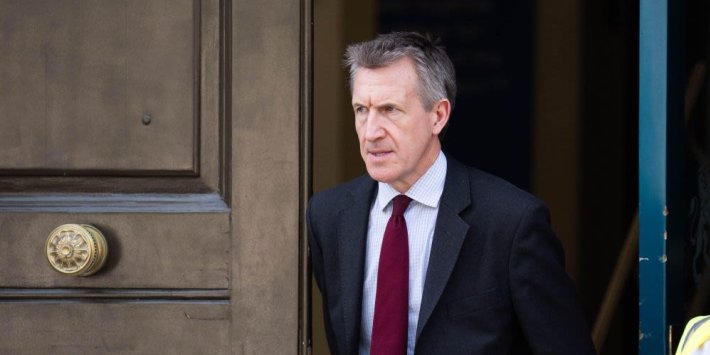
5 min read
Security minister Dan Jarvis has described accusations that the government interfered to collapse the China spy case as “all untrue” and defended the role of Keir Starmer’s national security adviser, Jonathan Powell.
The Prime Minister and Powell have come under growing scrutiny over the role they played in the decision by the Crown Prosecution Service to drop charges against two British men, one of whom was a parliamentary researcher, who were accused of spying for China.
The Labour government has been accused of preventing the case from going ahead to protect economic ties with Beijing.
Speaking in the House of Commons on Monday night, however, Jarvis said suggestions that the government had concealed evidence or withdrawn witnesses were “all untrue”.
He said that it was Powell’s deputy, Matthew Collins, who was responsible for deciding which evidence to give to the CPS, and that he did so without interference. The issue, Jarvis told MPs, related to “antiquated legislation” that the previous Tory government failed to update.
“This was a matter for the deputy national security adviser, a hugely experienced, highly capable senior official who provided evidence under the previous administration.
“The deputy national security adviser was given full freedom to provide evidence without interference, as was the case before the general election,” he said.
The security minister blamed the Official Secrets Act for the collapse of the trial, which he said the Conservatives had failed to modernise the legislation while in office.
“It was evident that the Official Secrets Act was no longer fit for purpose when Conservative ministers tasked the Law Commission with reviewing this antiquated legislation 10 years ago.”
Earlier on Monday, Downing Street said the claim that the government had collapsed the trial was “entirely false”. A spokesperson for Prime Minister Starmer told reporters the “decision to drop the case was entirely a matter for the CPS” and that there had been “no role for any member of this government, no minister or special adviser” in it.
The charges against Christopher Cash and Christopher Berry – who deny the allegations – were dropped by the CPS in September, as the evidence “no longer met the test”.
Jarvis told MPs that the government made “every effort” to support the case.
“The decision about whether to proceed with the prosecution was ultimately taken by the CPS, who were hamstrung by antiquated legislation that had not been updated by the previous Conservative government, despite the evolving nature of the state threats we face.”
He added: “The DPP [Director of Public Prosecutions] has given his assurance that the CPS was not influenced by any external party, any member of this government, nor any senior civil servant or special adviser working within it.”
The minister insisted that the government’s “pragmatic” approach to China has not come at the expense of national security.
The government has appeared to harden its position on Beijing, however, with ministers including Jarvis today saying the country posed security threats to the UK. Advocates of a stronger UK approach to China point to Beijing’s human rights record, its conduct in Hong Kong, and its cybersecurity threat to Britain.
“We fully recognise that China poses a series of threats to UK national security, yet we must also be alive to the fact that China does present us with opportunities,” he told MPs.
“The only way to act in the UK’s best interests is to take a long-term and strategic response. This means working in close coordination with wider allies to build collective resilience against the threats that China poses, and being unequivocal about our position on human rights.”
Responding in the House of Commons, Tory Leader of the Opposition Kemi Badenoch said it looked like a “deliberate decision to collapse the case” and accused the government of being “too weak” to stand up to China.
“The CPS had what it felt was a clear and compelling case to prosecute, but the trial has collapsed because for months and months the Government has been refusing to give the CPS vital information.
“This wasn’t a mistake, this wasn’t a misunderstanding, this looks like a deliberate decision to collapse the case and curry favour with the regime in China.”
Jarvis accused Badenoch of pushing “baseless smears”.
“I am genuinely really sorry that she has taken the opportunity to make a whole series of baseless smears, but perhaps we shouldn’t be too surprised because the statement that we have heard from the Leader of the Opposition is sadly typical of what we have heard from some of her colleagues in recent days,” Jarvis responded.
Conservative MP Iain Duncan Smith, who has long argued for a tougher UK approach to Beijing, criticised the “absurdity” of the government’s claim that Powell was not involved in the provision of evidence to the CSP.
“What is the point of the national security adviser who does then not involve themselves in matters of national security, as in this case.
“But instead we are meant to believe that the deputy national security adviser is allowed in this case to involve themselves in matters of national security, but not allowed to discuss these substantial matters of national security with the national security adviser,” he said.
Tory MP and former security minister Tom Tugendhat said the government’s position was “pure fabrication”.
The Liberal Democrats have called on the government to publish all correspondence between Collins and the CSP, with the party’s foreign affairs spokesperson Calum Miller saying it is “inconceivable that neither Keir Starmer nor his national security adviser knew what evidence was being submitted in such an important case”.
House of Commons Speaker Lindsay Hoyle said he was angry and disappointed that he had “not been able” to “protect Parliament”.
“It is MPs opposite who have been infiltrated, and at this moment, I do not feel we have had the protection. I do not blame the minister,” he said.
Jarvis also announced new anti-espionage guidance from MI5 to protect MPs and peers from foreign interference.
MI5 today warned MPs and others working in Parliament that they are being targeted by Chinese, Russian and Iranian spies. The new guidance instructs those working in Westminster to look out for “threat actors” seeking to elicit information, cultivate long-term and deep relationships or blackmail them. They should “keep track of odd social interactions”, particularly those which involve “overt flattery”, the guidance said.





